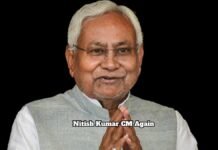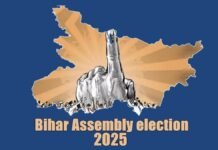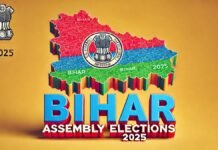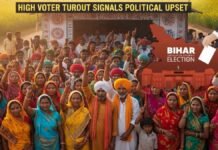
Key Points
- Free Electricity Promise: All Bihar domestic consumers to receive up to 125 units free power monthly from August 1, 2025, benefiting 1.67 crore households.
- Solar Expansion: State to generate up to 10,000 MW solar energy in the next three years, with a boost for rooftop and community solar plants under the Kutir Jyoti Yojana.
- Political Competition: The move comes in response to the opposition’s (RJD) bigger poll promise of 200 units of free electricity.
- Target Beneficiaries: Especially aimed at rural, middle-class, and economically weak households.
- Multiple Social Schemes: Joins a string of Nitish Kumar’s welfare announcements, including job creation and women’s reservation, ahead of polls.
Patna: Just months before the Bihar assembly elections, Chief Minister Nitish Kumar has announced a landmark welfare initiative: all domestic consumers in Bihar will be exempt from electricity charges for their first 125 units each month, effective August 1, 2025. The benefit will be reflected in the July billing cycle, directly impacting around 1.67 crore families across the state.
Official Announcement
Revealing the plan via his official X account, Nitish Kumar emphasized his government’s track record of supplying affordable power and stated:
“From August 1, 2025, all domestic consumers will not pay for the first 125 units of electricity. This decision benefits 1.67 crore families and strengthens our commitment to social justice and basic amenities.”
Context: A Policy Race Sparked by Opposition
The announcement serves as a pointed counter to the opposition RJD, whose leader Tejashwi Yadav has pledged 200 units of free electricity per household if elected. RJD leaders have claimed that Nitish’s move was prompted by their pressure and vision, while the ruling JDU has branded the scheme a “historic gift” to consumers.
Solar Surge: Bihar’s Ambitious Clean Energy Blueprint
In addition to the free power promise, Nitish Kumar’s government unveiled a plan to massively expand Bihar’s solar capacity:
- 10,000 MW Solar Target: Over the next three years, the state aims to generate up to 10,000 megawatts of solar energy.
- Kutir Jyoti Yojana: Extremely poor families will receive fully state-funded solar installations on their rooftops or at nearby public sites. Other households will get government support to adopt solar solutions.
- Consent-Based Rollout: Solar plants will be installed with the consent of residents, aiming for broad community acceptance.
The Stakes: Political and Social Impact
Nitish Kumar’s latest announcement joins a series of high-stakes welfare moves including reserved government jobs for women and promises of youth employment targeted at core voter segments in the run-up to fiercely contested 2025 assembly elections.
The scheme is expected to:
- Significantly reduce household electricity bills for millions, especially rural and low-income groups.
- Push Bihar towards clean energy leadership among Indian states.
- Heat up the political contest with the RJD, which touts even bigger freebies if elected.
Expert Opinions & Reactions
- JDU: Hails the scheme as a “historic” and inclusive pro-consumer policy and credits Nitish’s leadership for transforming Bihar’s power supply landscape.
- RJD: Claims credit for inspiring the move, stating Nitish’s government only responded after facing pressure from Tejashwi Yadav’s larger election promises.
- Political Analysts: See a fierce electoral competition to woo rural and middle-class voters through direct welfare initiatives.
What’s Next?
- Implementation starts with the July bill, seen in August 2025 for 1.67 crore households.
- Solar plant installation to be rolled out over three years under state schemes.
- Voters and political watchers await further announcements as election day draws closer, with the focus on how these mega-promises will actually impact everyday life for Bihar’s families.
Bihar’s big bet on free electricity and solar power in the context of an escalating political contest sets the stage for one of the most closely-watched and consequential state elections in recent years.




















































